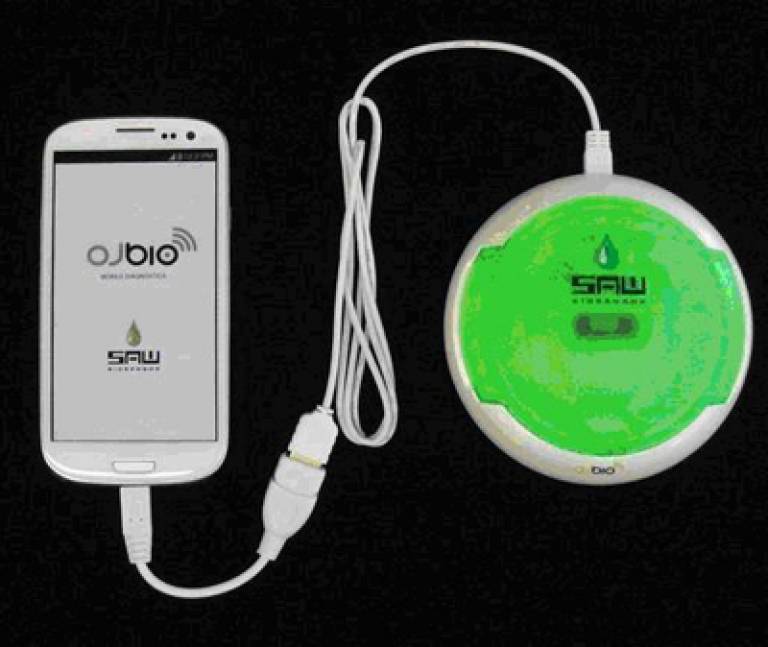Rapid, early warning HIV test in development thanks to £1 million funding
22 November 2012
A new hand-held device that can diagnose patients at the early stages of HIV and give results within minutes is in development following a £1 million investment in the technology.

The device, which resembles a smart phone, will help widen access to HIV testing in non-hospital settings, including GP surgeries, pharmacies, and community settings as the test and delivery of results will occur immediately. It could also be of benefit to health workers in developing countries who urgently need rapid and affordable ways to diagnose patients.
Researchers from UCL (University College London) and industry partners OJ-Bio have been awarded funding under the National Institute for Health Research (NIHR) Invention for Innovation (i4i) Programme.
The new device uses low-cost electrical sensors developed by OJ-Bio and partners Japan Radio Company, that are already used in mobile phones, called surface acoustic wave sensors. It will combine OJ-Bio's innovative sensor technology with special HIV-specific coatings developed at UCL. So far the technology has been proven to work using model HIV samples. Thanks to NIHR i4i funding, early stage clinical work will develop the technology to operate in human blood.
The beauty of our technology is its inherent sensitivity to low levels of multiple markers, with the potential for much earlier diagnosis of HIV. This will empower patients to gain earlier access to antiretroviral treatment with better associated health outcomes.
Dr Rachel McKendry (London Centre for Nanotechnology)
Dr Rachel McKendry, Reader in Biomedical Nanoscience at the London Centre for Nanotechnology and lead investigator from UCL said: "At the very early stages of HIV, marker proteins in a patient's blood are often very difficult to detect with current point of care tests. The beauty of our technology is its inherent sensitivity to low levels of multiple markers, with the potential for much earlier diagnosis of HIV. This will empower patients to gain earlier access to antiretroviral treatment with better associated health outcomes."
"It is exciting to work with OJ-Bio to develop this technology which could potentially benefit millions of people."
Dr Dale Athey CEO of OJ-Bio added: "The sensors are coated with a layer that captures HIV markers in a finger prick of blood. When these marker proteins associated with HIV stick to the sensor surface they alter its electrical signal related to the concentration in the sample. Our biochip devices are based purely on electrical components and therefore suitable for low cost mass manufacture."
The device rapidly displays clear advice messages on a screen, and where appropriate can be wirelessly transmitted to secure healthcare systems.
Professor Deenan Pillay, an NHS Consultant in Medical Virology, Director of UCL Partners Infectious Disease Programme and co-investigator, said: "There remain too many HIV infected individuals being diagnosed at a late stage of disease who require expensive hospital care and who have a significant risk of death. It is essential for HIV testing to be made easier and more accessible across a range of social and healthcare settings, such that they can be diagnosed and given effective treatment to prevent further ill health, and risk of transmission to others. Our research programme is dedicated to the development of novel tests which can fulfil this urgent requirement."
Robin Weiss, Professor of Viral Oncology at UCL, whose pioneering work in identifying the receptor for HIV has deepened our understanding of HIV/AIDS, adds: "The small and rapidly working device to detect several different markers important in HIV infection promises to be very important both in the UK and in Africa."
Developing a prototype hand-held device ready for clinical trials brings together a multidisciplinary team of scientists and researchers from the London Centre for Nanotechnology, UCL/MRC Centre for Medical Molecular Virology, NIHR UCL/UCLH Biomedical Research Centre, UCL Partners and the Royal Free NHS Foundation, working together with Newcastle based company OJ-Bio and their partners Japan Radio Company, a leading wireless communications company.
In the UK, there are an estimated 100,000 carriers of HIV but more than 25% are unaware of their infection. Worldwide, HIV/AIDS has grown to pandemic proportions and today there are 35 million people living with the virus, two-thirds of them in sub-Saharan Africa.
Image: the prototype diagnostic reader with smart phone connection. Credit: OJ-Bio
Media contact: Clare Ryan
 Close
Close

